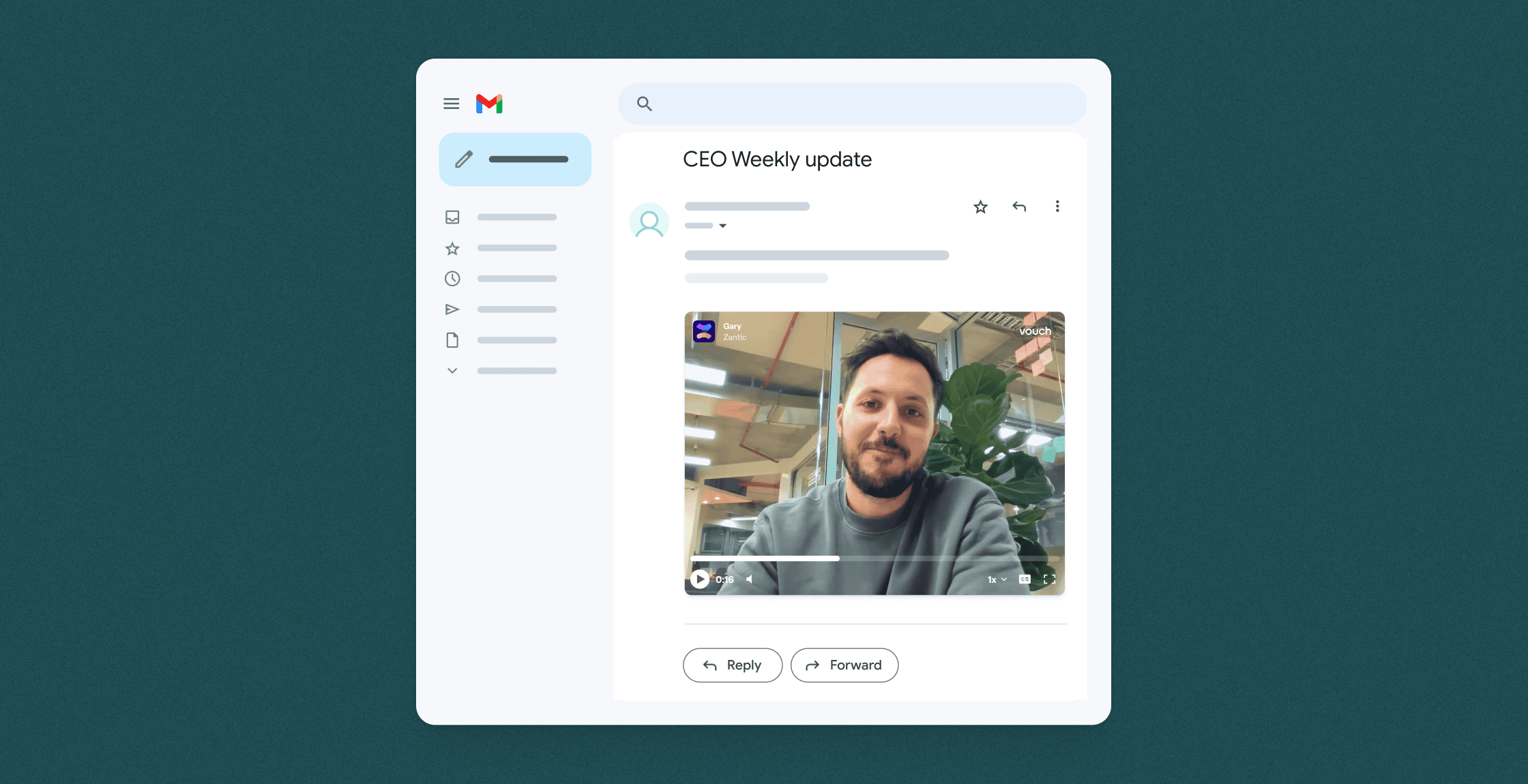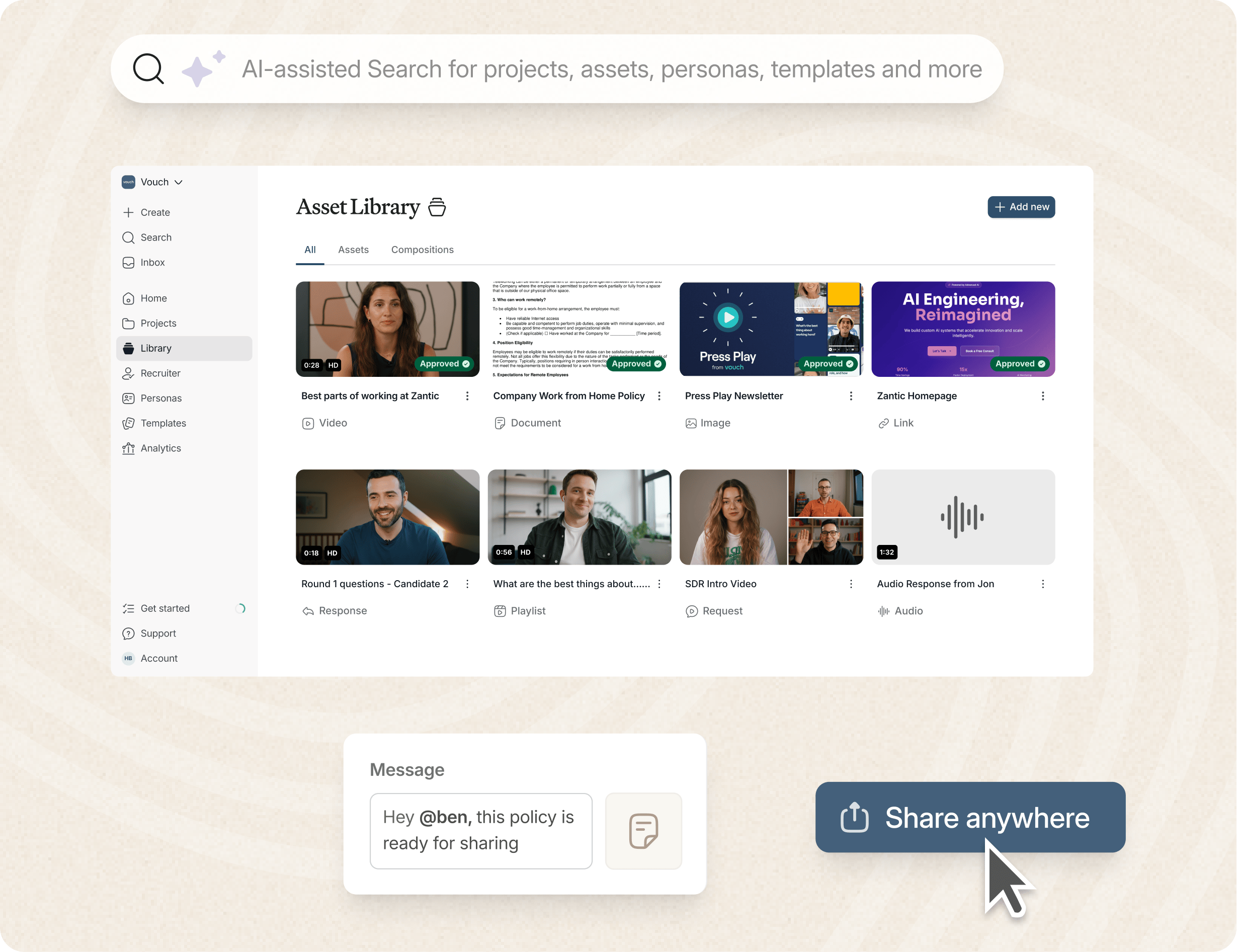
Why Communication is Important at Work: The Essential Guide
In 2026, businesses of all sizes, government departments, and even healthcare facilities are all hyper-paced workplaces.
The speed of the modern workplace is quite remarkable, and when you add to that the ability to manage remote workers and ever-growing financial pressures, it's easy to see why communication is important at work.
Every team member, from entry-level employees to C-level executives, needs to be on the same page.
In this article, we'll explain why personal communication is essential at work and provide a step-by-step guide to improving workplace communication.
Let's dive in.
Key takeaways:
- Poor communication can lead to significant productivity losses, costing businesses globally up to $7.8 trillion annually due to low worker engagement.
- Effective communication is crucial for a positive work environment, enhancing job satisfaction, team collaboration and overall productivity.
- Tools like Vouch promote transparency, help improve workplace communication and build trust among team members.
- Providing constructive feedback and internal training are essential practices for continuous employee development, culture and communications.
What Is The Impact Of Poor Communications?
This statistic by Gallup reports that Globally, up to $7.8 trillion in productivity is lost each year due to low worker engagement. Much of that is based on poor communication and motivation in the workplace.
Poor communication can wreak havoc on company culture, employee engagement, and job satisfaction. Ineffective communication always leads to misunderstandings, conflicts, and a lack of trust among team members.
It can be downright toxic and seriously impact your business's performance.
It goes with saying that when communication breaks down, so does your entire team's ability to work efficiently, resulting in wasted company money and higher personnel costs.
What is The Importance Of Effective Communication?
Effective communication is a cornerstone of a positive work environment, and that is why today we have experts in the field, like Internal Communications Specialists, who create and manage your internal communications policies, processes and training.
Your internal communications help create a harmonious, motivated workforce, which in turn leads to increased employee satisfaction and optimal productivity.
When your entire organization communicates effectively, your business will be running at its peak—and that's the bottom line of why communication is essential at work.
Benefits of Effective Communication
Effective workplace communication has numerous benefits, including:
- Enhanced Job Satisfaction: Employees who feel heard and understood are more satisfied with their jobs.
- Improved Team Building: Strong communication leads to better team cohesion and collaboration.
- Increased Efficiency: Clear communication reduces misunderstandings and streamlines processes.
- Better Decision-Making: When everyone is informed, decision-making becomes more effective and inclusive.
The AI-enabled workspace for talent teams.
- Unified workspace for talent teams
- Accelerate hiring with AI tools
- Auto-generate polished hiring and employer brand content
- Easily repurpose assets across all channel

Your Step-by-Step Guide to Effective Workplace Communication
If you feel or know your internal communications need more clarity or effectiveness, then the below steps will help significantly. Here they are:
Step 1: Train Your Employees For Better Communication Skills
At the end of the day, your internal communications rely on everyone's ability to listen and be an effective communicator. This includes active listening, clear and concise communication (hard and soft skills), and understanding the many different communication styles.
Remember that nonverbal communication is often as important as verbal, and it is essential for your team to understand and be able to read facial expressions and body language.
Step 2: Choose the Right Communication Tools
Different situations call for various communication tools. Whether it's an in-person meeting, a quick update via phone call, detailed instructions through an email chain or even better, through video, or regular touch with team members using a project management tool, selecting the appropriate medium is critical.
Effective communications often require a clear, well-thought-out strategy, and in larger companies, an in-house internal communications specialist who can not only implement the best channels and training but also track and improve communications.
Step 3: Promote a Culture of Transparent Communications
Research by EduMe shows that employees who feel heard are 4.6 times more likely to perform at their very best. The key to this is having a team that is comfortable expressing their views and, therefore, feels heard.
Transparent communication builds trust and encourages open dialogue across your entire team, from executives to interns.
If you are looking for a way to create a more open workplace culture, this guide will help you get started with a few brilliant internal comms ideas here: Internal Communications Video Ideas, 11 Ways To Inspire.
Step 4: Provide Constructive Feedback
An excellent study by Reward Gateway states that nearly 60% of employees would prefer regular praise and thanks over a 10% pay increase with no recognition.
Constructive feedback is essential for employee growth and development - and the foundation of feedback is your communication ability.
As a team leader, you should provide specific, actionable feedback that is delivered in a positive manner to help your team build confidence and encourage continuous improvement, contributing to a productive work environment.
When we look at why communication is important at work, we also need to consider employee feedback and surveys.
Step 5: Encourage Internal Training And Education
Communication goes beyond simply getting tasks done. In the world's most successful companies, your employees and executives are sharing their knowledge, too—with internal training strategies and tools like Vouch that make internal training easy.
Encourage team members to share their thoughts, ideas, and feedback in the form of a short learning video. This not only helps widen your team's overall abilities but also helps employees connect with each other on a deeper level and with more respect. It also gives your employees a sense of ownership in your company's success.
What Are The Most Common Workplace Communications Challenges?
Every workplace faces unique communication challenges. Whether dealing with external communications challenges or managing internal dynamics, effective communication strategies are essential for your workplace and corporate culture.
Here are a few common communications challenges:
- Conflict Resolution: Many companies struggle to address conflicts promptly and fairly. Using effective communication skills to mediate and resolve issues is vital, and if you need help with this, we would suggest engaging an external specialist to help.
- Building Healthy Relationships: Building a strong workplace culture relies on communication within your team. As teams grow, this becomes harder to manage and improve, and that's where strategies like employee spotlight videos can help bring teams together.
- Managing Different Communication Styles: Recognizing and adapting to different communication styles to ensure everyone is understood is always a challenge. Focusing on your diversity strategy is often the best first step - and your communications policies should be focused on our diversity policies.
FAQs
What is the impact of poor communication in the workplace?
When we consider why communication is important at work, we should highlight that poor communication leads to misunderstandings, conflicts, and a lack of trust, which in turn results in decreased efficiency and higher costs.
Why is effective communication essential in a work environment?
Effective communication builds a positive work environment, enhances job satisfaction, and improves team cohesion and productivity. Your company communications are directly tied to your bottom line.
What are some benefits of effective communication at work?
Benefits include increased job satisfaction, better team collaboration, higher efficiency, and improved decision-making. You can learn more here: Internal Communications Guides.
How can I improve communication within my team?
Improve communication by developing strong personal communication skills, choosing the right tools, promoting transparency, giving constructive feedback, and encouraging training. Tools like Vouch can be a major help for managers and team leaders.
What are common communication challenges in the workplace, and how can they be addressed?
Challenges include conflict resolution, building relationships, and managing communication styles. Address these with effective skills, team-building strategies, and a focus on diversity.
Conclusion
Effective communication is not just an essential skill; it's a critical aspect of a successful workplace. By following these five steps and continuously honing your team's communication skills, you can create a positive work environment where every team member thrives.
Remember, quality communication is the foundation of a productive and harmonious workplace, contributing significantly to your company's overall success.
So, take the time to assess your current communication practices and your tools, make necessary improvements, and watch as your workplace transforms into a more efficient, cohesive, and positive environment.
Vouch Makes Internal Communications Easier
Loved by companies like Canva, Nike, Cisco, HubSpot, Amazon, and more, tools like Vouch make leveraging video in your business communication and recruitment remarkably easy.
Be sure to book a Vouch demo today and chat with a video content expert.
You might also like

Elevate Your Brand Today With Vouch
Discover how Vouch can accelerate talent acquisition while helping you stay on-brand.





